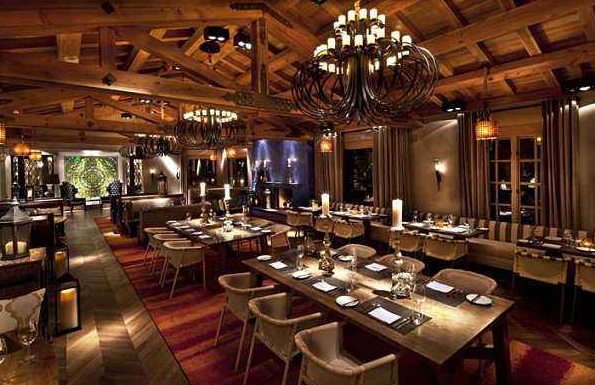It was supper time, we also were hungry. We peered into the dining room,
现在是午餐时间,我们也饥肠辘辘了。我们朝餐厅张望,
three tables full of men; a huge pile of beds on the floor, covered with hats and coats;
只见里面放着三张餐桌,都坐满了人。地板上堆着一堆木床,上面搭着帽子和衣服;
a singular wall, made entirely of doors propped upright; a triangular space walled off by sailcloth,
一面墙上立着做好的门,其他三面墙覆盖着帆布,
this is what we saw. We stood outside, waiting among the scaffolding and benches.
这就是我们看到的景象。我们站在外面,在脚手架和长条凳之间等待就餐。
A black man was lighting the candles in a candelabrum made of two narrow bars of wood nailed across each other at right angles, and perforated with holes.
这时,一个黑人点燃烛台上的蜡烛,这个烛台是用交叉搭成直角形的两根狭窄的木条组成的,上面钻了些小孔以便插蜡烛。
The candles sputtered, and the hot fat fell on the shavings below.
蜡烛发出噼噼啪啪的蜡油燃烧的声音,滚烫的蜡油掉在下面的刨花上。

"Dangerous way of lighting a room full of shavings," some one said. The landlord looked up at the swinging candelabra and laughed.
“小心点燃满屋子的刨花,”有人警告道,店主抬头瞥了一眼晃晃悠悠的烛台,笑了起来。
"Tried it pretty often," he said. "Never burned a house down yet."
“经常这样,”他说,“屋里从没有着过火。”
I observed one peculiarity in the speech at Garland City. Personal pronouns, as a rule, were omitted, there was no time for a superfluous word.
我在花环城发表的演讲中指出过该城的一大特色。一般来说,人们说话都会省略人称代词,因为根本没有时间听多余的词。
"Took down this house at Wagon Creek," he continued, "just one week ago, took it down one morning while the people were eating breakfast,
“在停马车的小溪那儿建的房子给拆了,”他继续道。“就在一星期前,一天早晨原来的房子拆了,当时大家都在吃早餐呢,
took it down over their heads, putting it up again over their heads now."
在他们的头顶上拆的房子,现在又在他们头顶上建起来了。”



